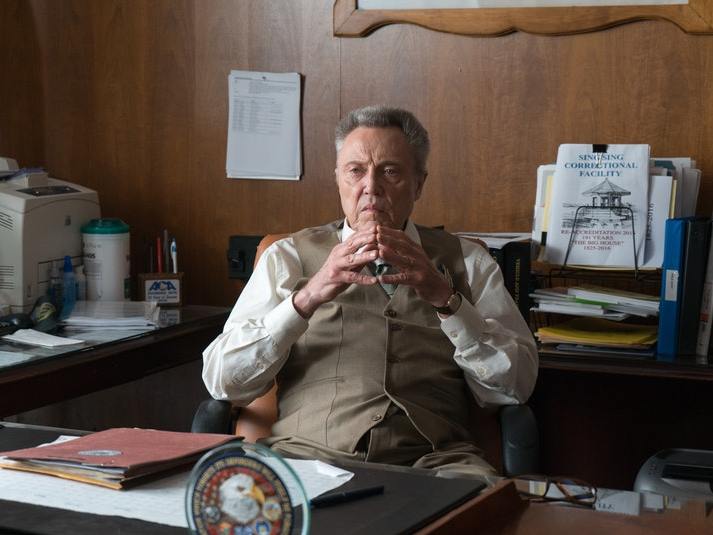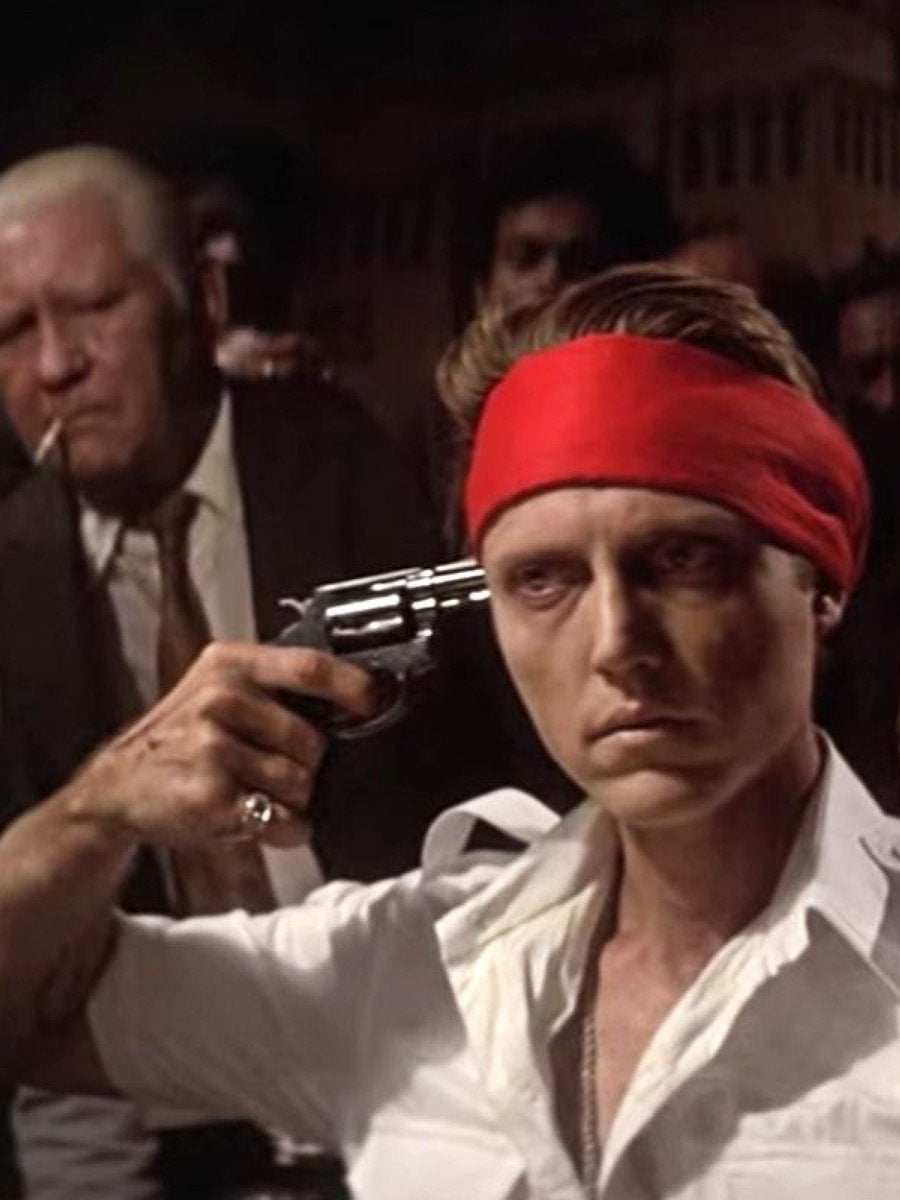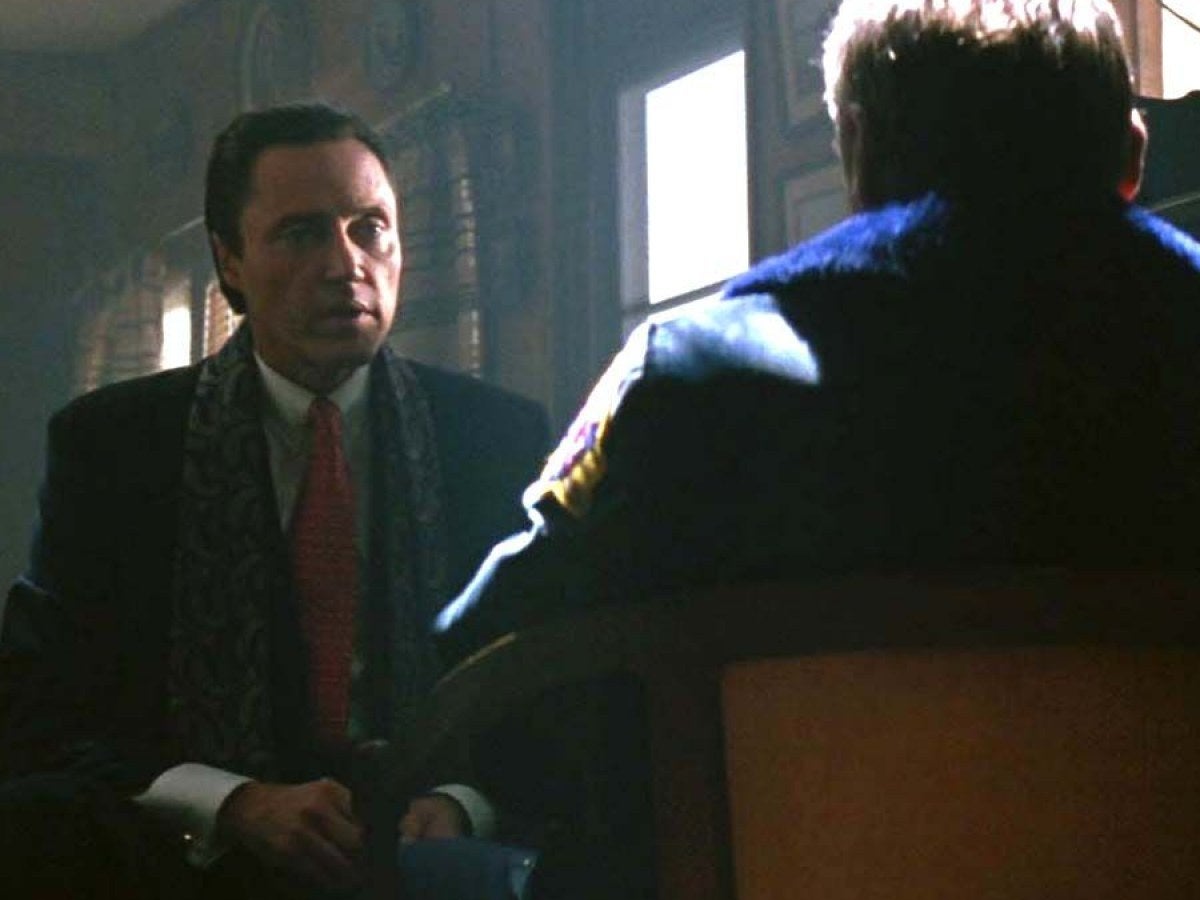Why Christopher Walken’s purring, terrifying ambiguity remains the secret to his success
More than 50 years after his debut, Christopher Walken is still one of Hollywood’s greatest mysteries, writes Geoffrey Macnab

French star Nathalie Baye has a revealing anecdote about working with Christopher Walken on Steven Spielberg’s Catch Me If You Can (2002). In the film, Baye and Walken are cast as the parents of con artist, Frank Abagnale (Leonardo DiCaprio). At the time, she was a major figure in French cinema who had played leading roles for directors like Francois Truffaut and Jean-Luc Godard but had made very few American films. When shooting began, she was very nervous. She remembers her first day on set, being in the make-up bus, “terrified, white”, and unable to eat. Walken, who played her husband, arrived three days after her. To Baye’s astonishment, he was even more apprehensive than she was. If she was white with fear, then he was green.
“He [Walken] couldn’t talk. He was terrified. I said, here’s a guy who makes so many incredible, good films… he was like a new actor with no experience, terrified to start a new film with Spielberg.”
The reason Baye’s story is so startling is that, on screen, Walken has rarely looked remotely perturbed about anything. He has absolute sangfroid in almost every role he has ever played. Outside his breakthrough as the traumatised young soldier playing Russian roulette in the Vietnamese gambling den in The Deer Hunter (1978), it’s hard to think of a film in which Walken is panicked or nervous. He has been acting since he was a kid. His Scottish mother sent him to drama school when he was only three years old. You can find old clips of him online as a child appearing opposite Jerry Lewis and Dean Martin in a comedy skit. Walken is the last actor you expect to suffer from stage fright. Baye’s story, though, reminds you of all those top athletes who throw up or have panic attacks before matches start and then perform as if they don’t have a care in the world. The nerves are what give them their impetus.
The veteran American is back on-screen currently (if not in cinemas because of coronavirus) in John Turturro’s new feature, The Jesus Rolls. It’s a typical late-period Walken cameo. He is playing a louche prison warden who, at the start of the movie, lets delinquent bowling ace, Jesus Quintana (Turturro reprising his character from The Big Lebowski), out of jail. Walken isn’t in the movie for long but we can see that familiar glint in his eye as he tells Turturro, “keep on bowling, boy!”. He takes a standard character role but plays it in incongruously flamboyant and subversive fashion, stealing the scene from under Turturro’s nose. He still has that familiar edge.
In the course of a screen career that stretches back to the mid-1960s, Walken has given many astonishing performances. Look through his filmography, which stretches to well over 100 movies, and you’ll find plenty of tender-hearted psychopaths and purring, charismatic villains. Walken is a trained dancer who has done more musicals than you might imagine. That’s why he has that Gene Kelly-like swagger and ease of movement. There are westerns, period gangster movies, sci-fi dramas, and even a few comedies. Few can match his gimlet-eyed stare or his knack of making the most banal and throwaway line seem like a deadly threat. Tall, lean, with sunken eyes and high and delicate cheekbones, he projects an inner arrogance and a sleek malevolence that has long made him the most effective Hollywood anti-hero of his era. For all his lofty dignity, he is not above clowning when a role demands it. Generally a mournful presence, he knows how to convey despair and desolation too.
“It’s Chris Walken’s face. That’s the subject of the movie; that’s what the movie was about. All the things that are in his face,” director David Cronenberg observed of The Dead Zone (1983), his Stephen King adaptation in which Walken played Johnny Smith, a high school teacher who awakens from a coma after a car accident. Five years have gone by. His fiancee (Brooke Adams) has married somebody else. The world has moved on without him.

Smith isn’t the typical Walken screen protagonist. A bespectacled, unassuming man who used to teach Edgar Allan Poe poetry and Washington Irving’s The Legend of Sleepy Hollow to his students, he is a long way removed from the charismatic psychopaths Walken so often plays. After he comes out of his coma, he discovers he has an uncanny psychic gift. If he touches someone, he can see into their inner life, both their past and their potential future. Walken captures the seething, restless anxiety of the character, tormented by his own powers. His features register the anger, dismay and fear he feels about his visions as well as his sense of duty. If he can intervene to save a child from burning or to protect the world from a crazed politician, he will do so.
For other directors, it’s not the face that distinguishes Walken but his instantly recognisable voice and the ability he has to put over a monologue. “As a writer, there is not a better actor living that can say your words,” Quentin Tarantino once said of him.
Walken squeezes more out of a Tarantino script than almost any other actor. Take, for example, his famous soliloquy in True Romance, which Tony Scott directed but Tarantino wrote. He plays the very urbane gangster, Vincenzo Coccotti, who, in one of the film’s most celebrated scenes, tortures a cop played by Dennis Hopper. Vincenzo is impeccably dressed, with a tie and a silk scarf. Speaking quietly, he introduces himself as “the antichrist… in a vendetta kind of mood”. In breaks between hitting and cutting up the cop, he gives him a Chesterfield cigarette to smoke. When the cop makes insulting remarks about his Sicilian heritage, he laughs and kisses him before resorting abruptly to extreme violence.

“There’s a connection between funny and scary,” Walken told Esquire magazine in a 2009 interview. “The human smile is in fact one of those primordial things, that in fact it’s a showing of teeth, that it’s a warning.” This is one of the insights on which he has built his career. No other actors can match his enigmatic smile. When you see his teeth, you know he is about to pounce.
Walken can be ingratiating and intensely threatening at the same time. He pauses for maximum effect. Audiences never know when he is joking or when he is in deadly earnest. In Tarantino’s Pulp Fiction, playing Vietnam veteran, Captain Koons, he tells a boy a strange, surrealistic story about a gold watch which has been passed from father to son through many generations and which his friend and fellow POW hid for five years “up his ass” before dying of dysentery. Now, having preserved the timepiece up his own ass for two years, he has come to present the watch to little Butch Coolidge so it can stay in the family. Walken makes the shaggy dog story about the watch seem poignant and obscene as well as absurd.
If you’re looking for Walken in full-blown Shakespearian tragic hero mode, his defining performance is surely as the mobster boss, Frank White, in Abel Ferrara’s sleazy crime epic, King of New York (1990). Amid the shoot-outs and scenes involving hookers and cocaine binges, Ferrara includes lots of close-ups of Walken in pale light, looking more like Hamlet than Al Capone as plaintive violin music plays on the soundtrack and he looks out over the night-time city. The cast includes Laurence Fishburne, Wesley Snipes, David Caruso and a very youthful Steve Buscemi, all giving hyper-charged performances, but while they’re leading their violent and frenetic lives, Walken is above the fray. He is the hoodlum and aesthete, well-dressed in his designer suits, poised and politely spoken even when he is shooting up rivals or killing cops.
The film starts with Frank coming out of Sing Sing, New York’s most notorious prison. He then takes up residence in the Plaza Hotel (owned in real life by Donald Trump) as if it is the only place he could ever consider staying. One moment he’ll be abusing the cops and the next he will be raising money for a children’s hospital in a poor part of town. It’s the perfect role for Walken, one that allows him to show his charm and his psychopathic menace. Frank is desperate to do something for the city he loves. He is the gangster and philanthropist. Ferrara also provides him with one of the best exits of any mobster boss, a man of the people, fleeing the police first on foot and then catching a cab – before being caught in a typical New York traffic jam.

It took Walken a long time to kick-start his career. Born in 1943, he was in his 30s before he won his Best Supporting Actor Oscar for The Deer Hunter. By then, he had racked up plenty of minor credits, playing Annie Hall’s brother in Annie Hall (1977), portraying a gigolo/ballroom dancer in James Ivory’s Roseland (1977), and starring in sci-fi movie, The Happiness Cage (1972). There had been long stretches when he wasn’t working. Perhaps that is why he has sometimes seemed so indiscriminate in his choices. Alongside the many acknowledged classics, there are quite a few duds (2003’s Gigli, and Kangaroo Jack) and forgotten films. On occasion, for example, when playing uber-villains in Bond or Batman films, Walken has skirted close to self-parody. Thanks to the longevity of his career and all his appearances on comedy shows and in pop promos, Walken is long since a household name. He is revered but also sometimes imitated and mocked.
What keeps Walken going is the nervous edge that so surprised Baye, the feeling that if he doesn’t play every role with the maximum intensity, he might still be found out.
Another of the secrets of Walken’s enduring success is his flair for portraying sleazeballs. ”Most of the jobs I get are basically very unwholesome people. There’s always something wrong with the guy, and sometimes something deeply wrong,” he noted in one interview, pretending to lament the fact he was never cast as the good family man with “a wife and kids and a dog and a house”. Audiences simply wouldn’t accept him in such a role. Besides, as he has shown again and again over the last 50 years, it is always far more interesting to stay on the dark side anyway.
The Jesus Rolls is available on iTunes and Amazon Prime. King of New York is on the BFI Player
Join our commenting forum
Join thought-provoking conversations, follow other Independent readers and see their replies
Comments
Bookmark popover
Removed from bookmarks